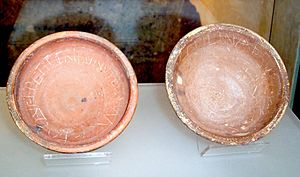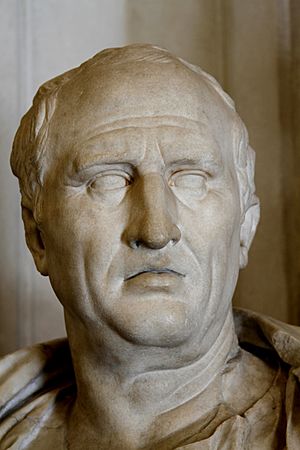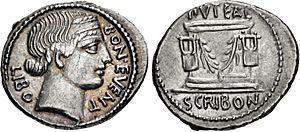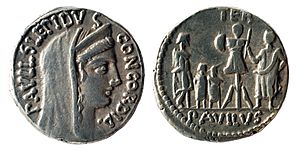Catilinarian conspiracy facts for kids
The Catilinarian conspiracy, sometimes Second Catilinarian conspiracy, was an attempted coup d'état by Lucius Sergius Catilina (Catiline) to overthrow the Roman consuls of 63 BC – Marcus Tullius Cicero and Gaius Antonius Hybrida – and forcibly assume control of the state in their stead.
The conspiracy was formed after Catiline's defeat in the consular elections for 62, held in early autumn 63. He assembled a coalition of malcontents – aristocrats who had been denied political advancement by the voters, dispossessed farmers, and indebted veterans of Sulla – and planned to seize the consulship from Cicero and Antonius by force. In November 63, Cicero exposed the conspiracy, causing Catiline to flee from Rome and eventually to his army in Etruria. In December, Cicero uncovered nine more conspirators organising for Catiline in the city and, on advice of the senate, had them executed without trial. In early January 62 BC, Antonius defeated Catiline in battle, putting an end to the plot.
Modern views on the conspiracy vary. Uncovering the truth of the conspiracy is difficult. It is well accepted that the ancient sources were heavily biased against Catiline and demonised him in the aftermath of his defeat. The extent of the exaggeration is unclear and still debated. Most classicists agree that the conspiracy occurred as broadly described – rather than being a manipulative invention of Cicero's – but concede that its actual threat to the republic was exaggerated for Cicero's benefit and to heighten later dramatic narratives.
Contents
History
Catiline's conspiracy was a major armed insurrection against Rome, like Sulla's civil war that preceded it (83–81 BC) and Caesar's civil war (49–45 BC) that followed it. The main sources on it are both hostile: Sallust's monograph Bellum Catilinae and Cicero's Catilinarian orations. Catiline, before the conspiracy, had been complicit in the Sullan regime. While his family had not reached the consulship since the fifth century BC, he had strong connections to the aristocracy and was both a nobilis and a patrician.
He had been prosecuted in 65 and 64 BC, but he was acquitted after several former consuls spoke in his defence. His influence even during his prosecutions was considerable. For example, Cicero had considered a joint candidacy with him in 65 BC. While some of the ancient sources claim Catiline was involved in a First Catilinarian conspiracy to overthrow the consuls of that year, modern scholars believe this first conspiracy is fictitious.
Causes and formation

Catiline had stood for the consulship three times by 63 BC and was rejected every time by the voters. Only after his defeat at the consular comitia in 63 – for consular terms starting in 62 BC – did Catiline start planning a coup to seize by force the consulship which had been denied to him.
He enlisted into his circle a number of disreputable senators: Publius Cornelius Lentulus Sura, a former consul ejected from the senate for immorality in 70 BC; Gaius Cornelius Cethegus, a Sertorian sympathiser with few prospects for promotion; Publius Autronius Paetus, a winning consular candidate in the elections of 66 BC who had his victory annulled and senate seat stripped after conviction on bribery charges; and two other senators expelled for immorality and corruption. Other malcontents who had expected but had been denied advancement joined the conspiracy, such as Lucius Cassius Longinus, who had been praetor in 66 and defeated in consular elections in 63 BC, Lucius Calpurnius Bestia, and two Sullae.
Non-senatorial men also filled the ranks. The classicist Erich Gruen describes these men as "mixed", adding, "single-minded purpose cannot readily be ascribed" to them. Some were frustrated candidates for municipal elections, some may have been motivated by debts, others sought profit in the chaos, others were members of declining aristocratic families like Catiline. What allowed them to raise a meaningful threat to the state was their mobilisation of men displaced by Sulla's civil war. Joining those dispossessed in the Sullan proscriptions were landed Sullan veterans who expected monetary rewards and had fallen into debt after poor harvests.
The ancient sources generally credit their involvement in the conspiracy with large debts that Catiline's putsch were supposedly to erase. But scholars reject this as a sole cause and consider the shame of unmet political ambitions indispensable. None of the ancient sources, except Dio, mention any connection between Catiline and land reform. It is likely Dio is wrong, if Catiline had advocated for land reform, Cicero would have alluded to it. Three of the conspirators had been repulsed at the consular elections. Another three had been ejected from the senate. Others found themselves unable to attain the same offices as their ancestors.
The conspiracy was for Roman citizens only. It was not one for slaves. Although Cicero and others stoked fears of another servile rebellion – the last servile rebellion had been suppressed in 71 BC – the evidence leans against their involvement. Catiline planned not a social revolution, but a coup to place himself and his allies in charge of the republic.
The defeat of the Rullan land reform bill early in 63 BC also must have stoked resentment: the bill would have confirmed Sullan settlers on their land, and allowed them to sell it to the state. It would have distributed new lands to poor dispossessed citizens. The failure of the relief bill at Rome contributed to the uprising's support among the poor. This was coupled with a general financial and economic crisis stretching back at least to the First Mithridatic War, a quarter-century earlier. With renewed demand for capital in the aftermath of stability secured by Pompey's victory in the Third Mithridatic War, moneylenders would have called in debts and increased interest rates, driving men into bankruptcy.
Discovery

The consul Cicero heard rumours of a plot from a woman named Fulvia in the autumn in 63 BC. The first concrete evidence was provided by Marcus Licinius Crassus, who handed over letters on 18 or 19 October which described plans to massacre prominent citizens. Crassus' letters were corroborated by reports of armed men gathering in support of the conspiracy. In response, the senate passed a decree declaring a tumultus (a state of emergency) and, after receipt of the reports of armed men gathering in Etruria, carried the senatus consultum ultimum instructing the consuls to do whatever it took to respond to the crisis.
By 27 October, the senate had received reports that Gaius Manlius, a former centurion and leader of an army there, had taken up arms near Faesulae. Some modern scholars have argued that Manlius' revolt was initially independent of Catiline's plans. , however, rejects this. In response, Cicero dispatched two nearby proconsuls and two praetors to respond to the possibility of armed insurrection with permission to levy troops and orders to maintain night watches.
Catiline remained in the city. While named in the anonymous letters sent to Crassus, this was insufficient evidence for incrimination. But after messages from Etruria connected him directly to the uprising, he was indicted under the lex Plautia de vi (public violence) in early November. The conspirators met, probably on 6 November, and found two volunteers to make an attempt on Cicero's life. Cicero alleged that the conspirators plotted to engulf Rome in flames and destroy the city. Sallust reports this allegation allowed Cicero to turn the urban plebs against Catiline, but modern scholars do not believe that Catiline credibly wanted to destroy the city.
After the attempts on Cicero's life failed on 7 November 63 BC, he assembled the senate and delivered his first oration against Catiline, publicly denouncing the conspiracy. Catiline attempted to speak in his defence – attacking Cicero's ancestry – but was shouted down and promptly left the city to join Manlius' men in Etruria. Writing a letter, likely preserved in Sallust, he committed his wife to the protection of a friend and left the city, justifying his actions in terms of honours unjustly denied to him and denying any alleged indebtedness.
Manoeuvres
When Catiline arrived in Manlius' camp, he assumed consular regalia. The senate responded immediately by declaring both Catiline and Manlius hostes (public enemies). Cassius Dio's history adds that Catiline was promptly convicted on the pending charges of vis (public violence). The senate dispatched Cicero's co-consul, Gaius Antonius Hybrida, to lead troops against Catiline and put Cicero in charge of defending the city.
Execution of the conspirators
At this time, Cicero then discovered a plot led by Publius Cornelius Lentulus Sura, one of the sitting praetors, to bring in the Allobroges, a Gallic tribe, to support the Catilinarians but the Allobroges revealed Lentulus' plans. Cicero, using the Allobroges' envoys as double agents, sought their cooperation in identifying as many members of the conspiracy in the city as possible. With evidence provided by their help, on 2 or 3 December, five men were arrested: Lentulus, Cethegus, Statilius, Gabinius, and Caeparius. After the Gallic envoys divulged all they knew with promises of immunity before the senate, the prisoners confessed their guilt; Lentulus was forced to resign his magistracy and the others were committed to house arrest.
An informer on 4 December attempted to incriminate Crassus in the Catilinarian plot but the informer was not believed and imprisoned. The same day, an attempt was also made to free the prisoners; the senate responded by scheduling a debate on their fate – along with the fates of four other conspirators who had escaped – for the following day.
The debate on the fate of the prisoners occurred in the Temple of Concord. Cicero, as consul, had been empowered by the previously passed senatus consultum ultimum to take whatever steps he thought necessary to safeguard the state, but such decrees, while lending moral support for consular action, did not grant any kind of formal immunity. Cicero's goal in requesting senatorial advice was probably to transfer responsibility for any executions to the senate as a whole. When later charged with killing citizens without trial, he justified his actions in terms of following the senate's non-binding advice.
Calling the senate in order of seniority, the consuls-elect and ex-consuls all spoke in favour of the death penalty. But when Julius Caesar, who then was praetor-elect, was called, he proposed either life imprisonment or custody pending trial. Caesar's lenient position won many senators over to his side, although it too was illegal – life sentences not being permitted without trial – and impractical. Cicero purports he then interrupted proceedings to deliver a speech urging immediate action but the tide did not turn towards execution until Cato the Younger spoke.
Plutarch's summary indicates that Cato gave a passionate and forceful speech inveighing against Caesar personally and implying that Caesar was in league with the conspirators. Sallust's version has Cato rail against moral decline in the state and has him criticising the senators for failing to be strict and harsh like their ancestors. With the appeal that swift execution would cause defections among the Catilinarians and exaggerated claims that Catiline was to be upon them imminently, Cato's speech carried the day.
With the senate ratifying Cicero's proposal to execute the conspirators without trial, Cicero had the sentences carried out, proclaiming at their conclusion, vixerunt (lit. they have lived). He was then hailed by his fellow senators as pater patriae ("father of the fatherland").
Final defeat
After the five prisoners were killed, support fell away from Catiline and his army. Some in Rome, such as the then-tribune Metellus Nepos, proposed transferring command from Antonius to Pompey, calling upon Pompey to save the state. Early the next year, near Pistoria, Catiline's remaining men, numbering at least three thousand, were engaged in battle by Antonius's forces. The now-proconsul claimed illness and Marcus Petreius was in actual command – and defeated, ending the crisis. Catiline was killed in the battle. Antonius was hailed as imperator.
Conclusion
While Cicero was initially hailed for his role in saving the state, he did not accrue all the credit, to his dismay. Cato was also hailed as having roused the senate to act against the conspirators. There were some turns against Cicero's actions in the immediate aftermath of the summary executions. At the close of the consular year, Cicero's valedictory speech was vetoed by two tribunes of the plebs. One of the tribunes, Quintus Caecilius Metellus Nepos, sought to bring Cicero up on charges for executing citizens without trial. The senate prevented him from doing so, by threatening to declare anyone who brought a prosecution a public enemy.
In the coming years, Cicero's enemies reorganised. Publius Clodius Pulcher, tribune in 58 BC, enacted a law banishing anyone who had executed a citizen without trial. Cicero promptly fled the city for Greece. His exile was eventually lifted and he was recalled to Rome the next year at Pompey's behest. Views on Cicero's success in defending the republic are mixed: while Cicero argued that he had saved the commonwealth and many scholars have accepted his defence of necessary exigency, Harriet Flower, a classicist, writes he did so "by circumventing due process and the civil rights of citizens" while also revealing "the consul's complete lack of confidence in the court system on which the New Republic of Sulla was supposed to be based".




